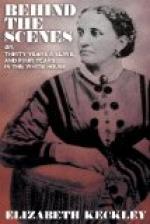PREFACE.
The institution of human slavery, as it existed in this country, has long been dead; and, happily for all the sacred interests which it assailed, there is for it no resurrection. It may, therefore, be asked to what purpose is the story which follows, of the experiences of one person under that dead and accursed institution? To such question, if it be asked, it may be answered that the narrator presents his story in compliance with the suggestion of friends, and in the hope that it may add something of accurate information regarding the character and influence of an institution which for two hundred years dominated the country—exercising a potent but baneful influence in the formation of its social, civil and industrial structures, and which finally plunged it into the most stupendous civil war which the world has ever known. As the enlightenment of each generation depends upon the thoughtful study of the history of those that have gone before, everything which tends to fullness and accuracy in that history is of value, even though it be not presented with the adjuncts of literary adornment, or thrilling scenic effects.
CHAPTER I.
Life on A cotton plantation.
* * * * *
Birth—sold in A Richmond slave pen.
I was born in Virginia, in 1832, near Charlottesville, in the beautiful valley of the Rivanna river. My father was a white man and my mother a negress, the slave of one John Martin. I was a mere child, probably not more than six years of age, as I remember, when my mother, two brothers and myself were sold to Dr. Louis, a practicing physician in the village of Scottsville. We remained with him about five years, when he died, and, in the settlement of his estate, I was sold to one Washington Fitzpatrick, a merchant of the village. He kept me a short time when he took me to Richmond, by way of canal-boat, expecting to sell me; but as the market was dull, he brought me back and kept me some three months longer, when he told me he had hired me out to work on a canal-boat running to Richmond, and to go to my mother and get my clothes ready to start on the trip. I went to her as directed, and, when she had made ready my bundle, she bade me good-by with tears in her eyes, saying: “My son, be a good boy; be polite to every one, and always behave yourself properly.” It was sad to her to part with me, though she did not know that she was never to see me again, for my master had said nothing to her regarding his purpose and she only thought, as I did, that I was hired to work on the canal-boat, and that she should see me occasionally. But alas! We never met again. I can see her form still as when she bade me good-bye. That parting I can never forget. I ran off from her as quickly as I could after her parting words, for I did not want her to see me crying. I went to my master at the store, and he again told me that he had hired me to work on the canal-boat, and to go aboard immediately. Of the boat and the trip and the scenes along the route I remember little—I only thought of my mother and my leaving her.




